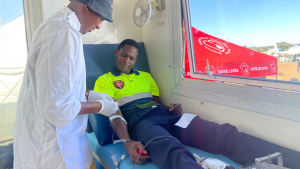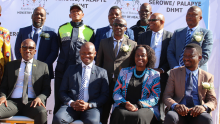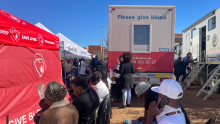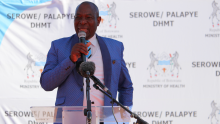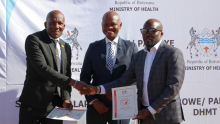Give blood, give plasma, share life, share often in Botswana and anywhere else!
The need for blood transfusions is constant, with thousands of people in Botswana relying on donated blood for various medical conditions, surgeries, and emergencies. However, the supply of blood often falls short of the demand.
World Blood Donor Day serves as a reminder to the nation about the importance of regular, voluntary, and unpaid blood donation to ensure a sufficient and safe blood supply. Speaking at the commemoration, the Minister for Health expressed concerns over Botswana failing to meet the national blood donation target of 45 000 pints per year. According to the Ministry of Health, in 2022 the national collection was 24619 pints, a slight improvement from the 2021 collection of 24224 pints. This low collection is already reported to have a negative impact on transfusion dependent patients and other emergencies.
Every year on 14 June, the world comes together to celebrate World Blood Donor Day, an occasion that recognizes and honors the invaluable contributions of blood donors worldwide. WHO Botswana joined the Ministry of Health at Sekgoma Memorial Hospital in Serowe to commemorate the day, raise awareness about the importance of donating blood and acknowledge the selfless individuals who played a vital role in saving lives in Botswana.
The theme for World Blood Donor Day 2023 was "Give blood, give plasma, share life, share often." This theme emphasized the critical role that blood donation plays in sustaining healthcare systems and ensuring that patients receive the life-saving transfusions they desperately need. Blood and plasma donors play a vital role in saving lives and there is a need for national solidarity to sustain regular and ongoing donations across the country. Furthermore, there is more need for the WHO and Ministry of Health and other stakeholders to continue to enhance blood donation systems to address any challenges in meeting the national demand for safe blood.
In recent years, the world has faced numerous challenges in maintaining an adequate blood supply. The COVID-19 pandemic further exacerbated these challenges, with disruptions in blood donation campaigns and a decline in donor numbers.
“It is the wish and intention of His Excellency the President of Botswana to create self-sufficiency in blood availability in all our health facilities. It is for this reason that this nation prides itself in its ability to improve and sustain the health of its people through voluntary and unpaid blood donation during this era where everything has been monetised.” the Minister for Health, Dr. Edwin Dikoloti remarked.
“We must address persistent challenges to ensure sustainable access to safe and quality-assured blood and blood products for needy patients. Through our collaborative efforts, we must raise adequate and sustainable funding and increase blood donation rates,” said WHO Country Representative Dr. Josephine Namboze.
One of the primary objectives of World Blood Donor Day was to encourage more individuals to become regular blood donors. It sought to dispel myths and misconceptions surrounding blood donation, educate the public about the process, and promote the health benefits of giving blood. Regular blood donation not only helps those in need but also offers numerous health benefits to the donors themselves, such as reducing the risk of cardiovascular diseases and maintaining healthy iron levels.
World Blood Donor Day commemoration also, presented an opportunity to express gratitude to the millions of voluntary blood donors in Botswana. These donors, motivated by a sense of compassion and a desire to make a difference, give their time, effort, and blood to save lives. Their commitment and generosity provide a lifeline for countless patients, giving them hope, strength, and a chance at recovery.
“Our country has a great potential to sustain its blood supply without outsourcing from other countries considering our healthy youth population of around 60%. I, therefore, urge the public in helping the nation to have access to safe and adequate blood and blood products every time they need it” the Minister of Health said.
Access to safe and sufficient blood and blood products is crucial for saving lives and improving health outcomes for patients in need. By inspiring the population to become regular blood and plasma donors the country can ensure a stable and reliable supply of blood as well as blood products to meet the constant demand in hospitals and healthcare facilities, thus saving countless lives. With the continued support of WHO, the Ministry of Health and the people of Botswana through joint efforts can bolster blood donations to meet national targets across the country. Together, the Ministry of Health, WHO as well as other stakeholders and the people of Botswana can keep the heart of the country beating.



